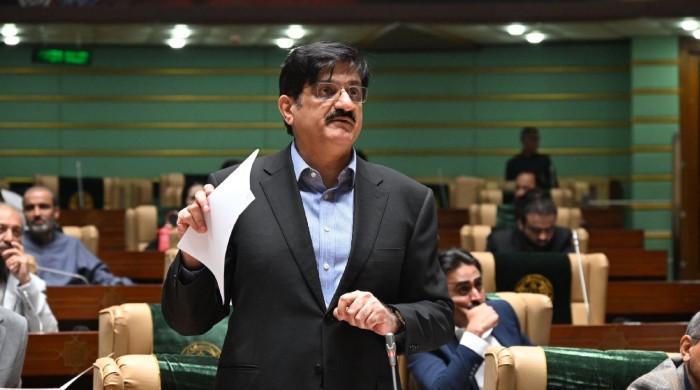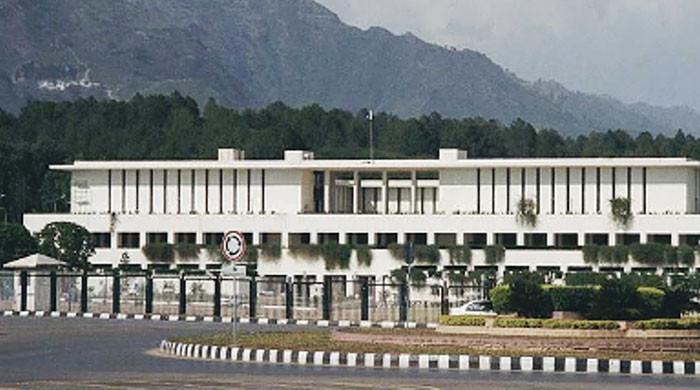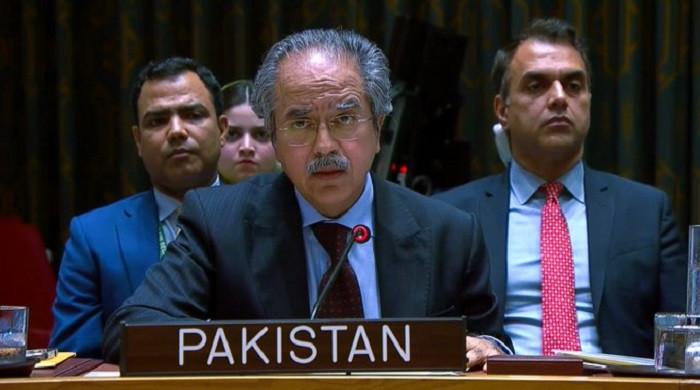Justice Isa reference: SC to resume its hearing today
SC was told yesterday that collection of material for filing reference against a judge court is subject to law
November 06, 2019
ISLAMABAD: The Supreme Court will today (Wednesday) resume its hearing of the petitions challenging the presidential reference filed against the top court's Justice Qazi Faez Isa.
In yesterday's hearing the Supreme Court was told that the collection of material for filing a reference against a judge of the superior court is subject to law.
A 10-member full court headed by Justice Umar Ata Bandial resumed its hearing in the pleas challenging a presidential reference filed against Supreme Court's Justice Qazi Faez Isa for allegedly not disclosing foreign properties of his family members in his wealth statements.
The bench also included Justice Maqbool Baqar, Justice Manzoor Ahmed Malik, Justice Faisal Arab, Justice Mazhar Alam Khan Miankhel, Justice Sajjad Ali Shah, Justice Mansoor Ali Shah, Justice Munib Akhtar, Justice Yahya Afridi and Justice Muhammad Qazi Amin Ahmed.
Also read: SJC issues two show-cause notices to Justice Qazi Faez Isa
Munir A Malik, counsel for Justice Qazi Faez Isa, while continuing his arguments, replied to questions asked by the court. In his arguments he contended that only after the approval of the president, material could be collected for filing a reference against a judge of a superior court.
The court in its last hearing had asked the counsel if the executive is empowered to conduct an inquiry against a judge through another forum other than specified in the law.
The court had also asked the counsel to tell under what law the collection of material could be made.
Malik contended that the Asset Recovery Unit (ARU) is not authorised to collect material against a judge.
Justice Maqbool Baqir asked the counsel as to whether the president is authorised to order any organisation for the collection of material against a judge.
To this, Malik replied that all the powers vested in the president are subject to the law as well. He alleged that the president did not use his mind and acted on the advice of the prime minister in sending the reference against the petitioner. Malik added that the prime minister alone cannot ask the president to file a reference but the cabinet.
Also read: Wife and children not my dependents, says Justice Isa
“If you come to the conclusion that this is the function of the executive, it means the cabinet and the prime minister cannot alone ask the president to file a reference against a judge,” Malik said and submitted that the appointment and removal of a judge is an executive function. Therefore, the approval of the cabinet is required.
“In a democratic country, the executive has the power to remove a judge. Then how the president could exercise the powers of the executive in a democratic government,” Justice Faisal Arab asked.
Malik said the president is required to form an independent opinion before filing a reference, adding that his post is not only a post box.
“Who will decide the matter pertaining to non-disclosure of assets,” Justice Maqbool Baqir asked the counsel.
The tax department, Malik replied, adding that the Supreme Judicial Council being a domestic tribunal cannot do it. He said every breach of law does not come under misconduct of a judge.
Justice Umar Ata Bandial observed that Article 209 of the Constitution is not applied only on judges of the superior court, adding that a member of the election commission as well as the auditor general of Pakistan could also be removed under the law.
Also read: Attorney General submits reply in Justice Qazi Faez Isa case
“So we have to be very much careful while dealing with the said article,” Justice Bandial remarked.
Malik contended that the judge is entitled to all fundamental rights as enjoyed by others.
“This court always comes when there is a need for interference in protecting such rights,” Justice Faisal Arab observed with a smiling face.
That’s why we came over here,” Malik replied. “I wanted to show that my client and his family members are subjected to surveillance,” Malik contended, adding that mere manhandling and detaining a judge is not meant for ridiculing. He submitted that in Justice Iftikhar Chaudhry’s case, he was manhandled; hence the principles are the same.
The counsel pleaded that the court should set parameters for the executive with respect to the privacy of judges and their families.
“Is it not proper that this court should lay down proper guidelines requiring the executive to take effective steps so that a judge is secured and he and his family are not surveyed upon,” Malik argued.
He contended that under Article 248 of the Constitution, the prime minister enjoys immunity but not his acts, adding that if he acts in violation of the Constitution, he loses immunity and his unconstitutional acts could be challenged in a court of law.
Justice Bandial observed the immunity does not apply to the personal life of the prime minister and ministers as well as to criminal offences. He questioned as to whether the immunity available to judges is not stronger than that of the immunity available to the prime minister. Even the parliament cannot debate the conduct of a judge.
Malik contended if the prime minister acts illegally, he will not be entitled to immunity available under Article 248. He said a complaint filed by Abdul Waheed Dogar was not put before the president, adding that the president is required to form his independent opinion instead of shutting his eyes.
Also read: Justice Qazi Faez Isa petitions Supreme Court to form full court
“You have talked extensively but did not show us specific allegations levelled by the learned judge in his petition,” Justice Munib Akhtar asked Malik. Tell us specifically where the prime minister and the president acted illegally.
At this, Malik read out paras and referred to pages of the petition where the petitioner judge had mentioned specific allegations.
During the hearing, the counsel also questioned the role of Federal Law Minister Farogh Naseem in filing of the presidential reference against Justice Isa. He stated that the minister bypassed the cabinet and sent the summary directly to the prime minister. He submitted that the law minister directed the Assets Recovery Unit (ARU) to inquire about Justice Isa and his family after filing the presidential reference.
“Despite the fact that he knew that the act he was doing was in contrary to law, he kept on the exercise”, Malik contended, adding that the law minister also issued a press release about the filing of the presidential reference.
Also read: Full bench to hear petitions challenging reference against Qazi Faez Isa
The presidential reference is without jurisdiction and constitutional authority as well as mala fide in the law because the president acted otherwise against Articles 209, 48, 49, 91 and 92.
Justice Syed Mansoor Ali Shah asked the counsel as to whether the president can initiate a reference on his own to which the counsel replied that if the president does not have valid information, he cannot.
Justice Mansoor asked if any government department like the FBR finds out any irregularity of any judge, how will it pass on information to the president.
Malik replied the FBR is required to process first and inquire into the illegality, in accordance with the law, and if it is found that the relevant law has been breached upon, it could seek the approval of the president in this regard.
The court adjourned the hearing till today (Wednesday). It is expected that in today's hearing Malik will argue on the matter pertaining to the appointment and removal of judges by the executive authority.











